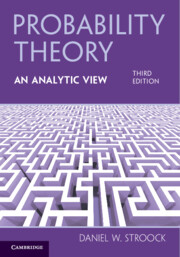Book contents
- Frontmatter
- Dedication
- Contents
- Preface
- Notation
- 1 Sums of Independent Random Variables
- 2 The Central Limit Theorem
- 3 Infinitely Divisible Laws
- 4 Lévy Processes
- 5 Conditioning and Martingales
- 6 Some Extensions and Applications of Martingale Theory
- 7 Continuous Parameter Martingales
- 8 Gaussian Measures on a Banach Space
- 9 Convergence of Measures on a Polish Space
- 10 Wiener Measure and Partial Differential Equations
- 11 Some Classical Potential Theory
- References
- Index
11 - Some Classical Potential Theory
Published online by Cambridge University Press: 07 November 2024
- Frontmatter
- Dedication
- Contents
- Preface
- Notation
- 1 Sums of Independent Random Variables
- 2 The Central Limit Theorem
- 3 Infinitely Divisible Laws
- 4 Lévy Processes
- 5 Conditioning and Martingales
- 6 Some Extensions and Applications of Martingale Theory
- 7 Continuous Parameter Martingales
- 8 Gaussian Measures on a Banach Space
- 9 Convergence of Measures on a Polish Space
- 10 Wiener Measure and Partial Differential Equations
- 11 Some Classical Potential Theory
- References
- Index
Summary
The intimate connection between Brownian motion of classical potential theory is described in Chapter 11. The first topic is again the representation of solutions to the Dirichlet problem in terms of the exit distribution of Brownian paths from a region. In particular, it is shown that, with probability 1, Brownian paths exit through regular points. This is followed by a discussion of the Poisson problem and its relationship, depending on dimension, to the transience or recurrence of Brownian paths. Among other things, a proof is given of F. Riesz’s representation theorem for superharmonic functions, and this result is used to introduce the concept of capacity. K. L. Chung’s formula for the capacitory potential in term of the last exit distribution of Brownian paths is derived and used to prove Wiener’s test for regularity in terms of capacity. Finally, the chapter concludes with two interesting connections, one made by F. Spitzer and the other by G. Hunt, between Brownian paths and capacity.
Information
- Type
- Chapter
- Information
- Probability Theory, An Analytic View , pp. 384 - 436Publisher: Cambridge University PressPrint publication year: 2024
